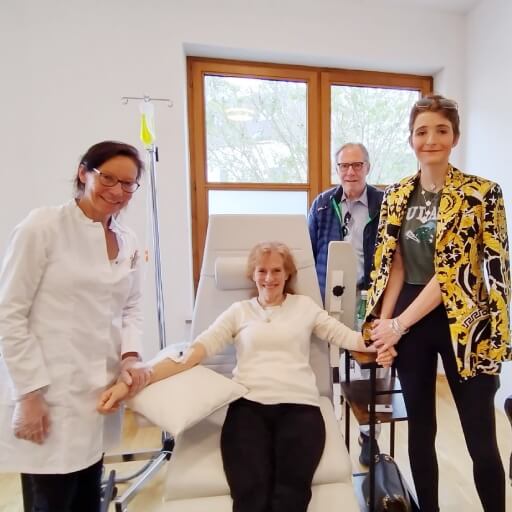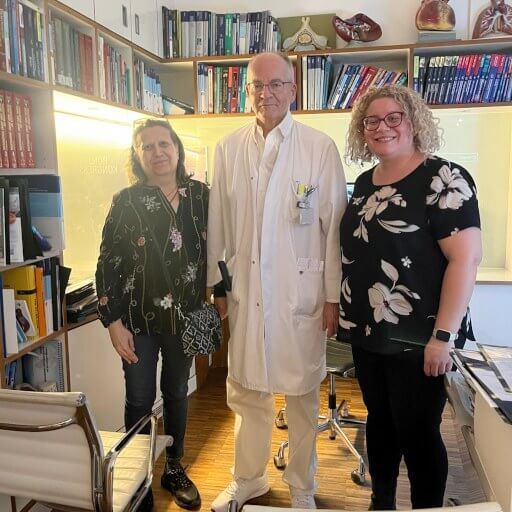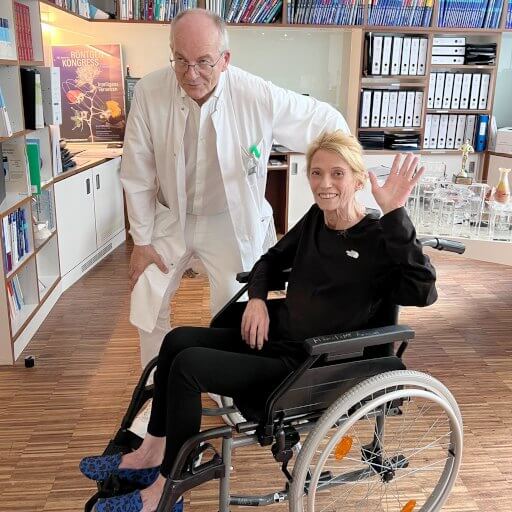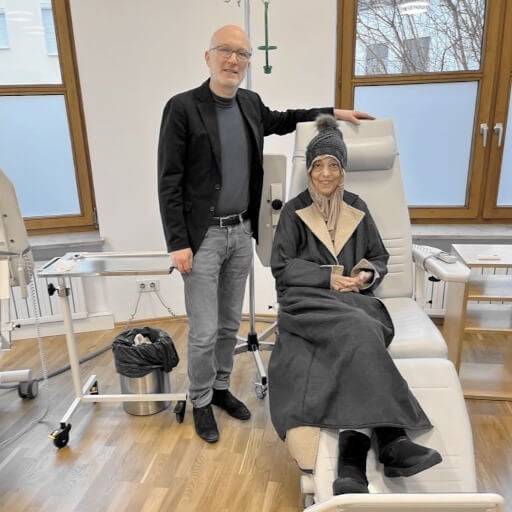Stage 4 of breast cancer is called advanced or metastatic. At this step, the tumor spreads beyond the breast to other organs. The American Cancer Society estimates that there will be 316,950 new cases of invasive breast cancer in women in the US in 2025 [1]. In the UK, there could be around 69,900 new cases every year by 2038-2040 [2].
For thousands of women facing this diagnosis, compassionate specialized care has made a significant difference in their cancer journey. 6 out of 10 women are initially diagnosed with stage 4 breast cancer, and nearly 30% of those diagnosed at early stages later develop metastases. Although once considered incurable, new innovative treatment methods are now offering renewed hope and possibilities for patients with advanced breast cancer.
Over the years, medical specialists have guided patients through complex treatment decisions, providing hope even in advanced stages. With personalized approaches that consider each woman's unique circumstances, many have found improved outcomes and quality of life.
Standard Treatment Options for Stage 4 Breast Cancer
Depending on the characteristics of the type of cancer, the extent of metastases, and the prognosis, doctors use such classical treatments as [3]:
- Chemotherapy. It is always the main treatment as it may help slow down the tumor growth and prevent metastasis. Unfortunately, chemotherapy does not lead to a cure. At the same time, all the standard side effects are present because the drugs are toxic and affect healthy cells.
- Hormone therapy. It is used for hormone receptor-positive types of cancer and can slow the growth of the malignancy. However, it does not stop the disease at stage 4 or prevent metastasis.
- Target therapy. Targeted drugs are useful against metastasis, but they also have side effects that negatively affect the quality of life.
- Immunotherapy. These drugs work by stimulating the immune system to recognize and eliminate cancer cells. Immunotherapy is usually administered in combination with other treatments.
- Surgery and radiation therapy. These therapeutic modalities are rarely used for stage 4 of breast cancer due to their inefficiency at this phase.
Traditional methods at this stage often lead to therapy resistance and a host of serious adverse effects that significantly impact a woman's quality of life.
Management of Breast Cancer at Advanced Stages
Treatment of advanced stages of breast cancer presents a challenge. Each clinical case requires a personalized treatment strategy based on the patient's health state, tumor characteristics, previous treatments, and their success. Because stage 3 cancer has already left its primary location and invaded nearby tissues, and patients with stage 4 cancer have distant metastases to other organs [4], management of the disease becomes complicated and requires a multidisciplinary approach.
Monotherapy is therefore not effective in advanced stages of breast cancer (BC), which requires complex therapeutic strategies combining various approaches: surgery and hormones; surgery, hormones, and chemotherapy; chemotherapy, hormones, and immunotherapy. As breast cancer (BC) is a highly immunogenic tumor, patients with this diagnosis are ideal candidates for novel immunotherapeutic techniques, such as dendritic cell vaccination, to generate specific anti-cancer immunity.
Considering the wide range of side effects that occur after systemic chemoradiotherapy, the patient's health is further compromised. Therefore, minimally invasive techniques become a priority. Interventional radiology techniques such as ablation (radiofrequency ablation, cryoablation, or thermoablation) and chemoembolization may assist in managing advanced breast cancer (BC). These methods are generally well tolerated by patients and provide clinically valid benefits such as improved tumor control and progression-free survival and destruction of metastatic lesions.
Innovative Methods of Treating Stage 4 Breast Cancer
For patients facing the challenges of stage 4 breast cancer, medical science continues to evolve with promising therapeutic approaches beyond conventional treatments. Among these advancements, specialized techniques offer targeted intervention with reduced systemic impact. These innovative methods provide hope for patients seeking alternatives or complements to traditional protocols, particularly when managing advanced disease that has spread to distant sites. By focusing on precision and minimizing collateral damage to healthy tissues, these approaches represent an important frontier in the ongoing battle against metastatic BC.
Interventional Radiology for Stage 4 Breast Cancer
Interventional radiology provides minimally invasive, image-guided procedures that precisely target tumors and metastases while sparing healthy tissues. These techniques utilize specialized instruments to deliver various energy forms (heat, cold, electricity, or chemicals) directly to cancer sites. This patient-friendly approach has helped many women with advanced cancer of the breast experience fewer side effects while effectively managing their disease, even in cases where tumors are located in challenging areas.
Thermal ablation (HIFU, LITT) utilizes highly focused heating to ablate the targeted tissues. HIFU (high-intensity focused ultrasound) utilizes focused ultrasound of high intensity, while LITT (laser interstitial thermal therapy) applies laser heat to treat the target. Both methods have recommended themselves in the treatment of hypervascular tumors, specifically locally advanced cancer of the breast. Studies of thermal ablation for hypervascular tumors demonstrated significantly improved local tumor control in a long-term perspective for cancer of the breast with liver metastases, which makes thermal ablation a valuable patient-friendly option.
Cryoablation is a minimally invasive technique that utilizes cold to deal with tumors [5]. It is already used in the treatment of intradermal metastatic lesions of melanoma and has demonstrated a clinical benefit in the treatment of benign prostate hyperplasia (BPH). Cryoablation is well-tolerated with no severe adverse effects. It improves progression-free time for months and local tumor control in more than 80% of cases. Above that, cryoablation can enhance the effect of immunotherapy.
Regional chemotherapy for metastatic breast cancer delivers concentrated drug doses directly through arterial infusion – bypassing systemic dilution that limits conventional IV therapy. When chemotherapy travels through 5-7 liters of blood before reaching tumors, most of the dose is essentially wasted. Regional chemotherapy for advanced breast cancer with arterial administration changes everything.
Breast tumors respond exceptionally well to this approach. These malignancies typically have excellent blood supply, making them ideal candidates for regional treatment. Clinical observations show a large percentage shrink dramatically – often rapidly enough that remaining tumor portions can be surgically removed after just one or two sessions [8].
Electrochemotherapy (ECT): A Cancer Treatment That Doesn't Use Heat, Cold, or Radiation
Electrochemotherapy in breast cancer stage 4 uses electric pulses to revolutionize drug delivery – creating temporary pores in tumor cells that allow chemotherapy to penetrate 70-80% more effectively. After electrotherapy, cancer cells become more porous, allowing significantly larger volumes of chemotherapy drugs to penetrate tumor tissue.
During electrochemotherapy treatment of breast cancer metastases or other neoplasms needles are positioned 2.5-3 centimeters apart around the tumor, with computer-controlled generators delivering precise electrical fields. Recent clinical data demonstrated locally relapsed unresectable breast cancer responded with 80%+ tumor shrinkage after initial electro-chemotherapy treatment [8]. Progression-free survival extends beyond one year in responsive patients.
The cost of electrochemotherapy reflects specialized equipment and multidisciplinary expertise, yet many find electrochemotherapy cost worthwhile given targeted precision and minimal systemic toxicity compared to repeated conventional chemotherapy cycles.

Transarterial chemoembolization (TACE) is a minimally invasive procedure when chemotherapy drugs are directly delivered via the catheter into the artery supplying the tumor [7]. At the time, the tumor and metastases are simultaneously blocked from receiving oxygen and nutrients using emboli (special particles). Chemoembolization provides a favorable tumor response in patients with breast cancer in whom conventional therapy has failed.
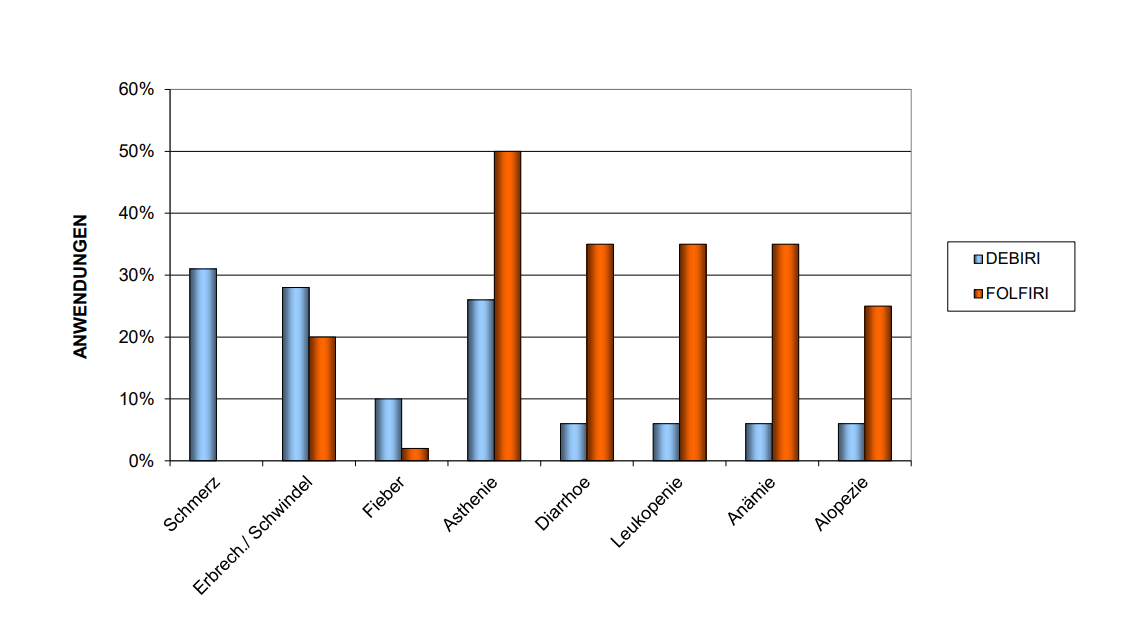
**DEBIRI = TACE, FOLFIRI = IV therapy; with DEBIRI, 90% of the patients have improved quality of life for 32 weeks
Studies in women with locally advanced breast cancer have shown that TACE significantly improves treatment response rates, with 47% of the patients achieving complete pathological response. A combination of standard chemotherapy with TACE can lead to even better results, as demonstrated by Japanese scientists. The combination of the interventions led to improved disease control and increased treatment response rates.
Four-Time Around the World with Metastatic Cancer: Prof. Kovács on Real Patient Outcomes
Dendritic Cell Therapy for Stage 4 Breast Cancer: Breakthrough in Cancer Treatment
Dendritic cell treatment is an innovative immunotherapy approach that enhances a specific anti-cancer immune response. This type of cell was discovered by Ralph Steinman, a Canadian physician and medical researcher. He demonstrated that dendritic cells can activate T-cells, which are crucial in adaptive immunity and develop immunological memory against many different pathogens. Ralph Steinman was awarded the Nobel Prize in Physiology or Medicine in 2011 for this discovery [6].
Dendritic cell therapy is a type of personalized immunotherapy that enhances a patient's immunity and helps to overcome the immunosuppressive tumor microenvironment. The safety and practicability of such immunotherapy in the treatment of cancer tumors are well documented, especially for treating stage 4 breast cancer in HER2-positive patients. Dendritic cell vaccines help to change the tumor microenvironment so that cancer cells are more susceptible to both the patient's immune response stimulated by dendritic cell vaccines and other treatments used alongside dendritic cell therapy. As a result, disease progression is stopped and overall survival rates are improved.
Dendritic cells are obtained from the patient's blood. They are then modulated ex vivo (in the laboratory) to load the information that enables them to recognize the specific cancer cells in the body. These modified cells are injected back into the patient's body and spread through the lymphatic system, transmitting information to lymphocytes, which then begin to overcome the defenses of the malignant cells, recognizing and destroying them.
Expert Insights from Prof. Gansauge: The Power of Dendritic Cell Therapy in Cancer Treatment
This kind of therapy is suitable even for the treatment of stage 4 breast cancer. It can also be combined with other treatments and brings little or no side effects.
Hyperthermia in Comprehensive Stage 4 Breast Cancer Management
Hyperthermia is a therapeutic method of heating a specific area or the whole body, which leads to irreversible changes in malignant cells. Since tumor cells are more sensitive to temperature changes, high temperatures can destroy them right away (the process is called thermal ablation) or cause changes that make these malignant cells more susceptible to other treatments like chemo- or radiotherapy.
Depending on the size of the area being treated, hyperthermia can be local, regional, and whole-body hyperthermia. Local and regional hyperthermia has demonstrated particular promise for locally advanced breast cancer (with chest wall involvement). Patients who cannot undergo surgery may also benefit from either local or regional hyperthermia. Whole-body hyperthermia is currently being actively researched as an alternative for breast cancer stage 4 management. Since it enhances the efficacy of chemotherapeutic drugs, this type of hyperthermia is typically used in patients with metastases.
Although hyperthermia is rarely used as a single treatment, it is applied as part of a comprehensive treatment strategy for breast cancer. Several studies demonstrated that hyperthermia combined with radiotherapy increases overall clinical response and disease control. It may be a reason why hyperthermia has been included in the Dutch cancer guidelines. As for National Comprehensive Cancer Network guidelines, it is stated that hyperthermia is particularly effective for breast cancer recurrence.
Even though there is still ongoing research on this method and the most efficient combinations for breast cancer treatment, the low level of complications and side effects, as well as its ability to strengthen the effects from other interventions, make hyperthermia a promising alternative for standard protocol methods.
Stage 4 Breast Cancer Treatment Options: Comparative Characteristics
Efficacy and response to treatment depend on factors such as the patient's condition, the type of tumor, and the combination of different methods. At the same time, average treatment outcome data can serve as a reference.
| Characteristics/Therapy type | 2-Year Survival Rate | Response Rate | Duration | Side Effects |
|---|---|---|---|---|
| Standard Treatment | ~25% for advanced cancer | Less than 10% | Several cycles | Severe (nausea, fatigue, hair loss, immunosuppression, skin irritation) |
| Innovative Methods | ~60% for advanced cancer | 45-65% | Up to 4 sessions | Mild (localized discomfort) |
*According to the Booking Health data.
**Success rates heavily depend on the combination of treatments used and disease stage.
Cost of Innovative Breast Cancer Treatment
The accurate cost typically depends on several factors:
- Tumor characteristics
- The extent of metastasis spread
- Choice of therapeutic modalities and their combination
- Duration of the treatment course
- Specific protocol requirements
Various countries can offer different management strategies consisting of both conventional treatments like chemoradiation and innovative modalities such as dendritic cell vaccination, hyperthermia, and TACE. A general overview of the prices for therapeutic interventions for stage 4 breast cancer is presented below.
| Treatment Method | GERMANY | GB | USA |
|---|---|---|---|
| Standard Treatment | €80,000 - €150,000 full course | €90,000 - €165,000 full course | €100,000 - €180,000 full course |
| Innovative Methods | €25,000 - €60,000 full course | €70,000 - €120,000 full course | €100,000 - €150,000 full course |
How Our Patient Beat Breast Cancer Stage IV: Story of Success
Feel this story of success and watch an inspiring story from one of our patients.
Magdalena Ivanova once received heartbreaking news: a recurrence of breast cancer, diagnosed at stage 4 with metastases in the bones. Given her previous experience with conventional treatments, which proved ineffective, Magdalena decided to explore alternatives. That's when she discovered dendritic cell therapy.
Despite her skepticism about the promise of a fully personalized dendritic cell treatment, she decided to give it a try, and the results exceeded her expectations. Upon arriving at the clinic, specialists collected a blood sample to create a personalized dendritic cell vaccine. The treatment process went smoothly, with no side effects and with continuous supervision by a professor. Comparing this to her initial cancer treatment, which involved a complex combination of conventional methods and severe challenges, Magdalena found a stark difference. Unlike her previous experience, dendritic cell therapy came with no restrictions or pain.
The expertise of the professor and the German clinic, along with the seamless organization by Booking Health, left a lasting impression on her. Despite the daunting stage 4 diagnosis and initial doubts, Magdalena is grateful she took the step toward dendritic cell therapy. Now she can share her journey as a story of recovery from stage 4 of breast cancer.
A Medical Journey: Every Step of the Way With Booking Health
Finding the best treatment strategy for your clinical situation is a challenging task. Being already exhausted from multiple treatment sessions, having consulted numerous specialists, and having tried various therapeutic interventions, you may be lost in all the information given by the doctors. In such a situation, it is easy to choose a first-hand option or to follow standardized therapeutic protocols with a long list of adverse effects instead of selecting highly specialized, innovative treatment options.
To make an informed choice and get a personalized cancer management plan, which will be tailored to your specific clinical situation, consult medical experts at Booking Health. Being at the forefront of offering the latest medical innovations for already 12 years, Booking Health possesses solid expertise in creating complex cancer management programs in each case. As a reputable company, Booking Health offers personalized stage 4 breast cancer treatment plans with direct clinic booking and full support at every stage, from organizational processes to assistance during treatment. We provide:
- Assessment and analysis of medical reports
- Development of the medical care program
- Selection of a suitable treatment location
- Preparation of medical documents and forwarding them to a suitable clinic
- Preparatory consultations with clinicians for the development of medical care programs
- Expert advice during the hospital stay
- Follow-up care after the patient returns to their native country after completing the medical care program
- Taking care of formalities as part of the preparation for the medical care program
- Coordination and organization of the patient's stay in a foreign country
- Assistance with visas and tickets
- A personal coordinator and interpreter with 24/7 support
- Transparent budgeting with no hidden costs
Health is an invaluable aspect of our lives. Delegating management of something so fragile yet precious should be done only to experts with proven experience and a reputation. Booking Health is a trustworthy partner who assists you on the way of pursuing stronger health and a better quality of life. Contact our medical consultant to learn more about the possibilities of personalized treatment with innovative methods for metastatic breast cancer with leading specialists in this field.
Cancer Treatment Abroad: Patient Experiences with Booking Health
Frequently Asked Questions of Our Patients About Stage 4 Breast Cancer Treatment
Send request for treatmentIt is an advanced stage of breast cancer when metastases spread from the mammary gland to other organs and systems.
The main symptoms include: the lump which is felt in the breasts; breast skin changes: red, swollen, and dimpled skin; the appearance of any nipple discharge; breast discomfort and pain; shortness of breath; pain in the bones; insomnia, fatigue, fever, and so on.
Both traditional methods (targeted therapy, chemotherapy, hormone therapy, and immunotherapy) and innovative approaches (dendritic cell therapy, stem cell therapy, and chemoembolization) are available for breast cancer stage 4 treatment.
Until recently, stage 4 breast cancer was considered incurable, with only palliative care provided. However, with advancements in medicine, there is increasing talk of potential long-term disease control and even remission.
According to the data from Cancer Research UK, 25 out of 100 women survive 5 years after they were diagnosed with stage 4 breast cancer and continue to live on by monitoring their condition.
This is an advanced cancer with malignant cells that affect other organs, leading to negative outcomes for their functioning and the general health status. The treatment is much more difficult and the survival rates are lower.
A breakthrough in treating stage 4 breast cancer is the use of dendritic cell therapy and chemoembolization. These innovative methods can be combined with conventional treatments.
Support is provided by psychologists who work with cancer patients and their relatives, specialized organizations for cancer survivors, and in some cases, specialized funds or insurance. As a medical provider, Booking Health offers comprehensive support throughout the treatment journey.
Conventional treatments have significant side effects (nausea, loss of appetite, constipation or diarrhea, fatigue, hair loss, etc.). Innovative therapies such as chemoembolization, dendritic cells, or hyperthermia have no or very few side effects.
The main goal of immunotherapy is to recognize and eliminate malignant tumors with the help of the patient's immune cells. This type of therapy for stage 4 breast cancer can be used in cases of Triple-Negative Breast Cancer (TNBC), where the tumor produces the PD-L1 protein.
This type of therapy is similar to chemotherapy in the mechanism of drug delivery, but the drugs are more focused on the malignant tumors, resulting in less damage to healthy cells.
While stage 4 breast cancer is not considered curable, long-term remission with modern therapies is possible. Advances in systemic, targeted, and immunological treatments can control the disease for years, improving both survival and quality of life.
The latest treatments for Metastatic Breast Cancer (MBC) include targeted therapies (CDK4/6, HER2, and PARP inhibitors), immunotherapy, dendritic cell vaccines, and interventional approaches like cryoablation and chemoembolization. These modern therapies are tailored to tumor subtype and patient response.
Yes, immunotherapy for stage 4 breast cancer – especially checkpoint inhibitors and dendritic cell vaccines – has shown positive results in some patients, particularly those with triple-negative or HER2-positive tumors. It enhances the body's ability to fight cancer with fewer side effects than chemotherapy.
Stage 4 breast cancer treatment in Germany for international patients is available through medical tourism providers such as Booking Health. Services include medical record evaluation, treatment planning, visa assistance, interpreter support, and full care coordination with leading oncology clinics.
The cost of stage 4 breast cancer treatment can vary by country. For example, in Germany, standard treatment costs between €80,000 and €150,000, while innovative methods (e.g., dendritic cell therapy or TACE) range from €25,000 to €60,000. In Great Britain, the cost averages €90,000-€165,000 for standard and €70,000-€120,000 for innovative treatments. In the USA, the full course may cost €100,000-€180,000 for standard options and €100,000-€150,000 for innovative ones. Availability and expenses are typically much higher in countries like Australia.
For stage 4 breast cancer, the average 2-year survival rate is around 25% with standard treatments and approximately 60% with innovative approaches (e.g., dendritic cell therapy or interventional radiology).
The response rate for stage 4 breast cancer is less than 10% with conventional therapies. On the other hand, innovative methods (e.g., TACE, dendritic cell immunotherapy, etc.) can show improved response rates of 45-65%.
Standard treatments for stage 4 breast cancer often cause severe side effects such as nausea, fatigue, hair loss, and weakened immunity. In contrast, innovative treatments generally lead to only mild effects, such as temporary localized discomfort.
Traditional treatment for stage 4 breast cancer involves several cycles over months. On the other hand, innovative therapies typically require up to four sessions with shorter recovery times and fewer hospital visits.
For stage 4 breast cancer, the most effective approaches combine standard therapies with innovative methods. In Germany patients benefit from dendritic cell therapy and interventional radiology techniques (such as cryoablation, electrochemotherapy, thermal ablation and TACE) which can target tumors precisely (while preserving healthy tissue).
Top German hospitals offer multidisciplinary care for stage 4 breast cancer integrating cutting-edge treatments. Teams use dendritic cell vaccines, TACE and minimally invasive ablation procedures in order to maximize tumor control and improve quality of life.
Choose treatment abroad and you will for sure get the best results!
Authors:
This article was edited by medical experts, board-certified doctors Dr. Nadezhda Ivanisova, and Dr. Bohdan Mykhalniuk. For the treatment of the conditions referred to in the article, you must consult a doctor; the information in the article is not intended for self-medication!
Our editorial policy, which details our commitment to accuracy and transparency, is available here. Click this link to review our policies.
Sources:
[1] American Cancer Society. Cancer Facts & Figures 2025. https://www.cancer.org/content/dam/cancer-org/research/cancer-facts-and-statistics/annual-cancer-facts-and-figures/2025/2025-cancer-facts-and-figures-acs.pdf
[2] Cancer Research UK. Breast cancer statistics. https://www.cancerresearchuk.org/health-professional/cancer-statistics/statistics-by-cancer-type/breast-cancer
[3] National Cancer Institute. Breast Cancer Treatment. https://www.cancer.gov/types/breast/patient/breast-treatment-pdq
[4] National Breast Cancer Foundation. Stage 4 Breast Cancer Overview. https://www.nationalbreastcancer.org/breast-cancer-stage-4/
[5] PubMed Central. Cryoablation for the treatment of breast cancer: immunological implications and future perspectives. Utopia or reality? https://pmc.ncbi.nlm.nih.gov/articles/PMC10879305/
[6] PubMed. The 2011 Nobel Prize in physiology or medicine. https://pubmed.ncbi.nlm.nih.gov/22053831/
[7] PubMed. Transarterial chemoembolisation for breast cancer with liver metastasis: A systematic review. https://pubmed.ncbi.nlm.nih.gov/28915408/
[8] Aigner K, Selak E, Pizon M, et al. Arterial infusion and isolated perfusion in combination with reversible electroporation for locally relapsed unresectable breast cancer. Cancers (Basel). 2024;16(23):3991. doi:10.3390/cancers16233991. [DOI]
Read:
Treatment of stage 4 breast cancer in Germany
Article menu:
- Standard Treatment Options for Stage 4 Breast Cancer
- Management of Breast Cancer at Advanced Stages
- Innovative Methods of Treating Stage 4 Breast Cancer
- Stage 4 Breast Cancer Treatment Options: Comparative Characteristics
- How Our Patient Beat Breast Cancer Stage IV: Story of Success
- A Medical Journey: Every Step of the Way With Booking Health
- Frequently Asked Questions of Our Patients About Stage 4 Breast Cancer Treatment
Don't know where to start?
Contact Booking Health

